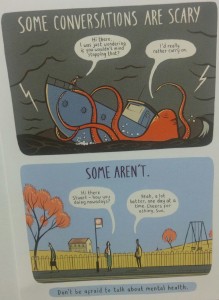 Mental health campaigns are all around us. In principle it seems like a great idea – raise awareness, lessen discrimination and increase support for those with mental health issues, right? But is that what’s happening? It might be controversial, but I don’t think so. There isn’t the equivalent campaign for ‘physical health’. Instead there are specific campaigns – signs of strokes; checking for breast cancer; minimising your risk of diabetes. Why then do we lump mental health together?
Mental health campaigns are all around us. In principle it seems like a great idea – raise awareness, lessen discrimination and increase support for those with mental health issues, right? But is that what’s happening? It might be controversial, but I don’t think so. There isn’t the equivalent campaign for ‘physical health’. Instead there are specific campaigns – signs of strokes; checking for breast cancer; minimising your risk of diabetes. Why then do we lump mental health together?
One in four people suffer from a mental health problem every year* yet there’s a huge difference between suffering from schizophrenia and functional depression, so what does that statistic tell us? Perhaps it normalises the idea of mental health problems, whatever the problem. That must be good, right? It tells us anyone can suffer mental ill-health. But is that true? Yes, in theory, but for the more severe illnesses, for the more debilitating conditions, you find the same people returning time and time again to mental health wards up and down this country. The support is not there to address the root issues and so their lives slowly but surely fall into a chaotic routine of regular hospitalisation. In such cases drugs often (though by no means always) play a role. Now whether the drugs cause the issues or vice versa I’m not qualified to say, but it seems pretty clear that mental health and drugs don’t mix well.
Why don’t the campaigns mention this? Why isn’t there more research into these issues? Why aren’t we raising awareness of some of the triggers and helping people avoid them? Why aren’t we campaigning for social services to support those with severe needs? Is there an underlying feeling that mental health campaigns need to be as apolitical as possible? That they must be feel good campaigns everyone can relate to, to have a chance of succeeding? So they bury the less heart warming stories of mental health challenges. They obscure the reality of what severe mental health conditions can do to an individual and all those around them. Surely by doing that they are missing the point; what then is the point after all – any campaign ‘success’ would be meaningless.
Then there is the issue of what these campaigns say is the ‘solution’ to supporting people living with mental health challenges? One well known campaign suggests it’s the small things that make a difference. Now, I don’t know about you, but the idea that spending five minutes to ask someone with mental health problems how they are, will make a meaningful and substantial difference doesn’t sit right with me. I’m often asked how I am, but I rarely give the true answer. Why? Because it often feels people aren’t really interested, they want a 140 character twitter style answer, same as these campaigns. When life is overwhelming and getting through the day is hard enough, you can’t explain that in brief – a coherent answer would take hours.
 The postcards from one of the national mental health campaigns show people answering their kindly neighbours/ friends/ colleagues who have taken five to ask them how they are. Without fail every card shows a positive response. What does this say? To me it says they are all bloody lying, but let’s put that thought aside for a minute. The main message they are giving Jo Public, is that asking is enough. Well it’s not. When people are struggling they need time and space to open up. What if their answer is not ‘fine’? Perhaps they suffered a miscarriage, their father had a psychosis, or they spent the evening googling suicide methods because it became too much. If you can’t say that, then you really can’t say anything at all. As someone who doesn’t always have a positive answer to such questions, I find it frustrating that our nation is obsessed with seeing the positive. It seems that people assume by brushing over the negative and asking leading questions to focus on the good it will help you when you are struggling. After all, the widespread appeal of Mindfulness – which focuses on being happy with what you have – seems to give the idea that it’s all in your head and we can just believe our way into acceptance. Unfortunately it’s often much more complex than that.
The postcards from one of the national mental health campaigns show people answering their kindly neighbours/ friends/ colleagues who have taken five to ask them how they are. Without fail every card shows a positive response. What does this say? To me it says they are all bloody lying, but let’s put that thought aside for a minute. The main message they are giving Jo Public, is that asking is enough. Well it’s not. When people are struggling they need time and space to open up. What if their answer is not ‘fine’? Perhaps they suffered a miscarriage, their father had a psychosis, or they spent the evening googling suicide methods because it became too much. If you can’t say that, then you really can’t say anything at all. As someone who doesn’t always have a positive answer to such questions, I find it frustrating that our nation is obsessed with seeing the positive. It seems that people assume by brushing over the negative and asking leading questions to focus on the good it will help you when you are struggling. After all, the widespread appeal of Mindfulness – which focuses on being happy with what you have – seems to give the idea that it’s all in your head and we can just believe our way into acceptance. Unfortunately it’s often much more complex than that.
These adverts send out the message that we should be grateful that someone (gave the impression that they) cared. They tell us what our answer should be. But those of us who are struggling already know the ‘correct’ answer. That’s how we get through the day – by pretending. But it’s not fine. And these campaigns need to challenge that, not add to it. Personally I find being able to talk about the negative things helps me feel better and I’m sure I’m not alone.
There is a glaring absence too from these campaigns and mental health services; the families of those with mental ill-health. The families and loved ones are ignored, overlooked; not even considered worthy of involving as a support system for the ‘patient’. Once it all breaks down the institutions are quick to shout – get out, get out while you still can. They have little concern with where you will get out to, and no concern with what happens to your own mental health afterwards. How can these families, who are so critical and so affected, be ignored so consistently, even by these campaigns which are supposedly trying to challenge the system?
I’m grappling with these issues every day and although I have no answers I know one thing, ‘how are you**?’ is rarely enough to allow someone to open up. It can be asked in a way that shows you care, but a five minute wonder it is not. Perhaps these campaigns could be looking at what questions really help. Perhaps they could highlight that for many people, whatever those questions are, our answers won’t be positive, and perhaps they could stop trying to push us into a twitter sized space. Then, maybe, just maybe, we might start to have some honest conversations about mental health.
Support
If you or a loved one are suffering from mental ill-health MIND has useful support and information. You can also speak with your GP for help.
References
* statistic from MIND
** although it is a great improvement on ‘are you feeling better?’ – asking that pushes people to feel like they must answer a certain way or they are just being negative.
You can keep up to date with my latest blog posts by subscribing online at Ellamental Mama, or liking me on facebook. You can also follow me on twitter @EllamentalMama
13th July 2016 at 7:54 am
Ugh, those postcards are awful. Of course conversations about mental health are scary, whether you are the person asking or answering. Mental illness is scary. What’s the point of telling people it isn’t?
13th July 2016 at 2:28 pm
So true!!